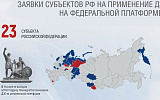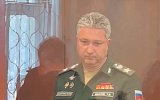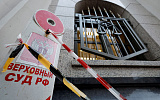For many years the Nezavisimaya Gazeta-the first independent Russian daily that was brought to life by the collapse of Communism (Nezavisimaya is Russian for "independent")-has been at the forefront of bringing top quality news to the people of Russia.
Since Sep. 1, 1999, we have been providing a daily edition of the Nezavisimaya on the World Wide Web (www.ng.ru), changing for ever the way information is delivered in this country.
As the first Russian newspaper to publish truly comprehensive Internet edition, we take advantage of the new technology by providing links from each day's news and feature articles to related items throughout today's and recent issues, and provide a comprehensive and detailed archive of material for background and research that no single day's printed edition could ever hope to match.
The weekly Nezavisimoye Voyennoye Obozreniye, or the Independent Military Review (e-mail address: nvo@ng.ru), hit the web in October 1999. Its print edition has exited for almost five years.
Encouraged by the popularity of its predecessor The War and the Army, a section in the Nezavisimaya daily, we launched the Independent Military Review in February 1995.
In a very short time it became one of the most authoritative and comprehensive military publications in Russia. The Independent Military Review carries weekly news and analysis, comment, interviews and reports on modern wars and armed conflicts, on military doctrines and reforms in the army and in the navy, stories on new weapons and cutting-edge military technology, both Russian and Western.
We also run stories about Russia's special services, such as the Federal Security Service, the Foreign Intelligence Service and the Federal Border Service. We publish reports about foreign secret services, including the Central Intelligence Agency, MI-6 and Mossad.
The success of the review has been extraordinary-but by no means accidental. All of the review's journalists are seasoned military experts. Many of them have been with the Nezavisimaya Gazeta from the time of its inception.
That was no coincidence. When we were starting the Nezavisimaya Gazeta, one of the guiding principles was an objective and balanced approach to all major institutions of the Russian state, including the military and the special services.
Nor is it a coincidence that many decisive and-more often than not-tragic moments of Russia's benighted history were directly related either to war or to the state of the country's military.
The Russian revolution of 1917 was in many ways a result of the unprecedented hardships of World War I. A lost arms race, and a quagmire in Afghanistan brought about the dissolution of the Warsaw Pact, which in its turn ushered in the collapse of the Soviet empire.
And remember what happened in early 1996, when the war in Chechnya was sputtering away and Mr. Yeltsin faced the risk of defeat at the ballot box. His advisers were united in their determination to keep him in office, but could not agree on the best way.
One camp thought that the president could still win an electoral contest; another wanted him to extend his rule by engineering a political or military crisis, declaring a state of emergency and canceling the poll. The latter camp coincided precisely with the "war party" which also saw advantage (political and, almost certainly, financial too) in the waging of a cruel and open-ended conflict in Chechnya. In the end, the more moderate members of Mr. Yeltsin's entourage won, but only by the skin of their teeth.
The bloodshed in Chechnya divided and demoralized Moscow's liberal reformers, and gave heart to some of the darkest elements in the odd coalition of forces that have since kept Mr. Yeltsin in office.
During the seven unbridled years of helter-skelter, often mismanaged but nonetheless desperately-needed reform, the Nezavisimaya Gazeta, unlike only too many Russian publications, has never been guilty of unreasonable distrust or fear of Russia's military-or contempt for the country's surly generals, perceived by many as mere Soviet nostalgists. We have, indeed, spared Russia's domestic and foreign ill-wishers some vociferous party-pooping.
As time goes by, the role of the Russian army only grows. The bombing of Serbia has spread a deep-and perhaps long-lasting-chill over NATO's relations with Russia. The West's hoped-for, bear-hugging strategic partnership with a newly democratic Russia gave way pretty quickly to one of a pricklier sort: a readiness to agree where they could, but to disagree openly and at times bad-temperedly where they couldn't.
But while acknowledging all this, at the same time we have been championing full government and public control over the military and the special services. We have criticized and exposed-and will continue to do so-everything that was unacceptable in the military and cloak-and-dagger history of Russia.
Yet, time and again we firmly opposed frequent attempts by many Russian politicians to shift the blame for their own mistakes onto the army, as was, for example, the case in Chechnya in 1996.
In my opinion, the Independent Military Review is a unique-in terms of its scope and depth of analysis -publication in Russia. Over the past few years, all of Russia's defense ministers and chiefs of staff, as well as heads of most of the country's special services, wrote for the weekly. So did, in fact, defense ministers of Great Britain, the United States, Israel, Italy, France, Finland, and member-countries of the Commonwealth of Independent States. So did NATO leaders, many Russian and foreign generals, and military experts.
I would, indeed, venture to say that the Independent Military Review is Russia's most unsecrete and peaceful-but at the same time a very effective-weapon.
















